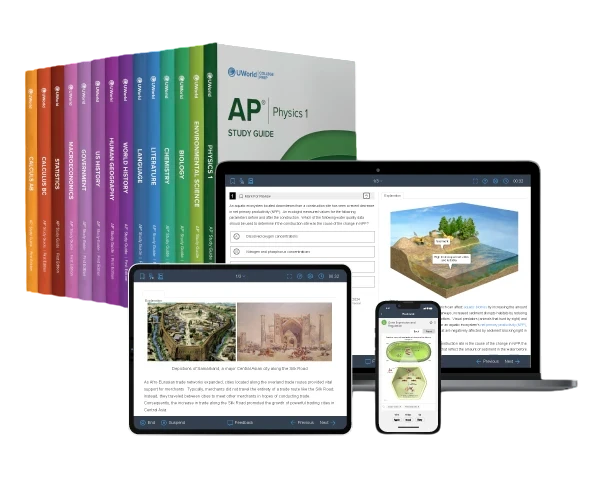Understanding AP Courses: Foundation for Success
Advanced Placement® (AP) courses represent one of the most valuable opportunities for high school students to challenge themselves academically while potentially earning college credit. With over 30 AP courses available, choosing the right combination can significantly impact your college admissions prospects and future career path.
AP courses are college-level classes taught in high school, culminating in standardized exams scored from 1 to 5. Developed by the College Board®, these rigorous programs allow students to engage with challenging material while demonstrating readiness for higher education.
When selecting the best AP courses to take, students should consider their academic strengths, career interests, college goals, and personal bandwidth. The key is finding balance between challenge and manageability while aligning course choices with future aspirations.
Best AP Courses by Career Path
When you’re thinking about your future, your AP choices matter. Start by exploring courses that connect with careers you may want to pursue; engineering, medicine, law, business or finance.
Best AP Courses for Engineering
Engineering programs value students who demonstrate strong analytical and problem-solving skills. The best AP courses for engineering include:
Mathematics and Science Foundation:
- AP Calculus BC: Essential foundation for all engineering disciplines, providing the needed mathematical groundwork.
- AP Physics C: Mechanics and Electricity & Magnetism: Relevant to foundational concepts and widely recognized as essential in advanced programs.
- AP Chemistry: Crucial for chemical, materials, and environmental disciplines; beneficial across all technical fields.
- AP Computer Science A: Increasingly important as programming becomes integral to modern technological innovation.
Additional Strong Choices:
- AP Statistics: Valuable for data analysis and research methodology.
- AP Environmental Science: Relevant for environmental and civil engineering specializations.
Best AP Courses for Pre-Med and Medicine
Medical school committees look for students who excel in rigorous science coursework while maintaining well-rounded academic profiles. The best AP courses for pre-med and best AP courses for medicine include:
Core Science Requirements:
- AP Biology: Fundamental for understanding human physiology and medical concepts.
- AP Chemistry: Essential foundation for biochemistry and pharmacology.
- AP Physics 1 and 2: Provides understanding of physical principles underlying medical technology.
- AP Calculus AB or BC: Required for many pre-med programs and useful for understanding medical research.
Supporting Coursework:
- AP Psychology: Directly relevant to human behavior and mental health.
- AP Statistics: Crucial for interpreting medical research and epidemiology.
- AP English Language or Literature: Strengthens reading and writing skills essential for medical school success.
Best Online AP Courses for Law
Law schools prioritize critical thinking, analytical reasoning, and exceptional communication skills. The best AP courses for law include:
Critical Thinking and Communication:
- AP English Language and Composition: Develops persuasive writing and rhetorical analysis skills.
- AP English Literature and Composition: Enhances critical reading and textual interpretation abilities.
- AP Seminar and AP Research: Build research, argumentation, and presentation skills.
Social Sciences and Humanities:
- AP U.S. History: Provides constitutional and legal history background.
- AP Government and Politics: Offers direct exposure to legal and political systems.
- AP Psychology: Useful for understanding human behavior in legal contexts.
Best AP Courses for Business
Business careers require analytical skills, economic understanding, and practical problem-solving abilities. The best AP courses for business include:
Core Business Foundation:
- AP Macroeconomics and Microeconomics: Essential for understanding market forces and economic principles.
- AP Statistics: Critical for business analytics and financial modeling.
- AP Calculus AB or BC: Important for advanced business and economics coursework.
- AP Computer Science A: Increasingly important for business technology and data analysis.
Communication and Analysis:
- AP English Language: Develops business communication and persuasive writing skills.
- AP Psychology: Useful for marketing, management, and consumer behavior understanding.
Best AP Courses for Finance
Financial careers demand advanced quantitative skills and economic understanding. The best online AP courses for finance specifically include:
Quantitative Core:
- AP Calculus BC: Advanced mathematical reasoning for financial modeling and derivatives.
- AP Statistics: Essential for risk analysis and financial data interpretation.
- AP Macroeconomics: Understanding of monetary policy and market forces.
- AP Microeconomics: Individual market behavior and pricing theory.
Supporting Subjects:
- AP Computer Science A: Programming skills for algorithmic trading and financial technology.
- AP Physics: Mathematical modeling skills applicable to quantitative finance.
Best AP Courses by Grade Level
Your AP journey builds year by year. Freshman year looks different from junior year, so it’s important to choose classes that fit your stage in high school while preparing you for what’s ahead.
Best AP Courses for 9th Graders
Freshman year should focus on developing essential core skills while introducing AP-level rigor gradually. The most common AP courses for 9th graders include:
Popular Option:
- AP Human Geography: Excellent introduction to AP-level coursework with manageable content.
Best AP Classes to Take Sophomore Year / 10th Grade
Sophomore year allows for increased AP course load while building toward junior year intensity. The best online AP classes to take sophomore year include:
Strong Sophomore Choices:
- AP World History: Modern: Builds global perspective and analytical skills.
- AP Computer Science Principles: Develops computational thinking, creative problem-solving, and programming fundamentals.
- AP Statistics: Accessible math option for students not ready for calculus.
- AP Seminar: Builds your research, writing, and presentation skills (many schools offer it as English 10).
- AP European History: Broadens your understanding of modern societies and critical historical developments.
Best Online AP Courses in High School (Junior Year Focus)
Junior year typically represents the peak of AP course-taking, as students demonstrate maximum academic rigor for college applications. The best AP courses in high school during junior year include:
Core Academic Subjects:
- AP English Language and Composition: Critical for developing college-level writing skills.
- AP U.S. History: Comprehensive examination of American historical development.
- AP Calculus AB/BC: Advanced mathematical preparation for STEM major fields.
- AP Chemistry or AP Physics: Rigorous science coursework demonstrating analytical ability.
Strategic Additions:
- AP Economics: Practical knowledge for understanding economic systems.
- Foreign Language APs: Continued linguistic development.
Best AP Classes to Take Senior Year
Senior year AP selection should balance college preparation with manageable workload during the application process. The best AP classes to take during senior year include:
College Preparation Focus:
- AP Literature and Composition: Prepares for college-level writing expectations.
- AP Calculus BC: Provides advanced math preparation for STEM fields.
- AP Physics C: Advanced physics for engineering-bound students.
- AP Economics: Practical knowledge for adult life and business understanding.
Maintaining Academic Rigor:
- AP Government and Politics: Relevant for civic engagement and political science majors
- AP Art and Design: Allows completion of portfolio projects
Best Online AP Classes for College Admissions
If your goal is college admission, the right AP classes can make you stand out. Top schools want to see that you’ve challenged yourself while still keeping balance in your schedule.
Best AP Classes for Ivy League
Ivy League and other highly selective institutions expect students to take the most rigorous curriculum available. The best AP classes for Ivy League admission typically include:
Core Academic Rigor:
- AP Calculus BC: Demonstrates advanced mathematical ability.
- AP Physics C (both courses): Shows mastery of challenging scientific concepts.
- AP Chemistry and AP Biology: Proves ability in multiple science disciplines.
- AP English Literature and Language: Exhibits exceptional communication skills.
- AP Foreign Language: Indicates cultural awareness and linguistic ability.
Depth and Breadth:
- AP U.S. History and AP World History: Shows historical thinking skills
- AP Microeconomics and Macroeconomics: Demonstrates understanding of complex systems
- AP Computer Science A: Reflects technological literacy
- AP Statistics: Exhibits quantitative analysis capability
Ivy League applicants typically take 8-12 AP courses throughout high school, with many achieving scores of 4 or 5 on their exams.
Best AP Classes for Business Majors
Business program admissions favor students who demonstrate quantitative skills and practical thinking. The best online AP classes for business majors include:
Quantitative Foundation:
- AP Calculus AB/BC: Mathematical reasoning for business analytics
- AP Statistics: Data analysis and business research skills
- AP Economics (Macro and Micro): Core business and market understanding
- AP Computer Science A: Technology skills for modern business
Communication and Context:
- AP English Language: Business writing and communication
- AP Psychology: Consumer behavior and management insights
- AP Government: Understanding of regulatory and policy environments
Best Online AP Courses and Classes
Online AP courses offer flexibility for students whose schools don't offer certain subjects or who need scheduling accommodations. The best online AP courses and classes provide several advantages:
Advantages of Online AP Learning
- Access to courses not available at your school.
- Flexible scheduling around other commitments.
- Self-paced learning opportunities.
- Often smaller class sizes and more individual attention.
- Ability to take courses during summer or off-periods.
Most Effective Online AP Courses
Technology and Math Courses:
- AP Computer Science A and Principles: Well-suited to online format with interactive programming exercises.
- AP Statistics: Mathematical concepts with online practice tools and simulations.
- AP Calculus AB/BC: Benefits from online graphing tools and step-by-step problem solving.
Social Sciences and Humanities:
- AP Economics (Macro and Micro): Conceptual nature translates well to online learning with interactive models.
- AP Psychology Course: Reading and discussion-based content works effectively online.
- AP Government and Politics: Current events integration enhances online learning experience.
Language Courses:
- Foreign Language APs: Multimedia resources, pronunciation tools, and cultural immersion enhance language learning online.
Considerations for Online AP Success
- Requires discipline and time management.
- Limited hands-on laboratory experiences for science courses.
- Reliable technology and internet access.
- Communication with instructors may be less immediate.
Maximizing AP Success with Quality Preparation
Picking AP courses is only half the battle; you also need to succeed in them. The right prep tools can help you stay on track, reinforce your learning, and feel confident on test day.
The Role of Supplemental Preparation
While classroom instruction is the foundation for AP success, many students also benefit from additional preparation resources. Quality supplemental materials can make the difference between a passing score and college credit.
Premier AP Preparation Resources
As a comprehensive AP exam preparation resource, UWorld has established itself as a leading provider of high-quality test preparation materials across multiple academic and professional fields. Their AP preparation offers:
- Proven Track Record: Success in medical and professional exam preparation translates to AP offerings.
- Comprehensive Question Banks: Extensive practice questions that mirror actual AP exam format and difficulty.
- Detailed Explanations: Every question includes comprehensive explanations for both correct and incorrect answers.
- Performance Analytics: Detailed tracking to identify strengths and weaknesses across content areas.
- Subject-Specific Expertise: Materials developed by experts who understand both content and exam requirements.

Integrating Preparation into Your AP Prep Study Plan
How you prepare day to day will decide your success. A clear study plan ensures you practice consistently, build confidence, and walk into your exam, ready to perform your best.
Early Preparation Strategy
- Begin using supplemental materials early in your AP course
- Use practice questions to reinforce classroom learning
- Identify areas needing additional attention through regular assessment
Focused Review Sessions
- Use performance analytics to create targeted study sessions
- Focus on weakest areas while maintaining strengths
- Practice with timed conditions to build test-taking stamina
Exam Preparation
- Increase practice intensity in months leading up to AP exams
- Simulate actual testing conditions and timing
- Review explanations thoroughly to understand reasoning patterns
Build Your Optimal AP Course Plan
By now, you have explored your options and have a good idea of the AP classes that fit your goals. The next step is organizing them into a clear plan. With the right guidance, you can align your course selections with your strengths, long-term goals, and college aspirations. This helps you balance challenge with manageability, ensuring you stay motivated while building a strong academic profile. Create a roadmap that sets you up for success both in high school and beyond.
Assessment and Planning Process
Step 1: Self-Assessment
- Evaluate your academic strengths and interests.
- Consider your career goals and college aspirations.
- Assess your current workload and time management skills.
- Review graduation requirements and college admission expectations.
Step 2: Course Sequencing
- Plan AP courses across all 4 years of high school.
- Ensure prerequisites are met for advanced courses.
- Balance difficult courses across different years.
- Consider scheduling conflicts and teacher recommendations.
Step 3: Support Systems
- Identify available resources at your school.
- Research online and supplemental preparation options.
- Plan for tutoring or study groups if needed.
- Discuss plans with counselors, teachers, and parents.
Step 4: Flexibility and Adjustment
- Build flexibility into your plan for unexpected changes.
- Be prepared to adjust based on academic performance and interests.
- Consider adding or dropping courses based on college application needs.
- Monitor stress levels and academic balance throughout high school.
Common Planning Mistakes to Avoid
Overloading Too Early: Many students attempt too many AP courses too soon, leading to burnout and lower performance across all subjects. Build gradually toward peak AP courses in junior year.
Ignoring Personal Interests: While strategic course selection matters for college admissions, students perform best in subjects that genuinely interest them. Balance strategic thinking with personal passion.
Neglecting Prerequisites: Some AP courses require specific background knowledge or prerequisite courses. Plan accordingly to ensure you're prepared for advanced coursework.
Focusing Only on Prestige: Not all AP courses carry equal weight for college admissions or career preparation. Choose courses that align with your goals rather than just perceived difficulty or prestige.
Sample AP Course Progressions
STEM-Focused Track:
- 9th Grade: AP Computer Science Principles
- 10th Grade: AP Biology, AP Statistics
- 11th Grade: AP Chemistry, AP Calculus BC, AP Physics 1
- 12th Grade: AP Physics C, AP Environmental Science Course
Liberal Arts Track:
- 9th Grade: AP Human Geography Course
- 10th Grade: AP World History, AP Psychology
- 11th Grade: AP U.S. History Course, AP English Language, AP Government
- 12th Grade: AP English Literature, AP Economics, Foreign Language AP
Business/Finance Track:
- 9th Grade: AP Human Geography
- 10th Grade: AP Statistics, AP Psychology Course
- 11th Grade: AP Macroeconomics, AP Microeconomics, AP Calculus AB
- 12th Grade: AP Computer Science A, AP English Language Course
Conclusion: Building Your Path to Success
Selecting the right combination of AP courses requires careful consideration of your academic abilities, career interests, and college goals. Whether your path is engineering, medicine, law, business, finance, or any other field, strategic AP course selection sets the stage for college and beyond.
The best online AP courses are those that align with your goals while challenging you appropriately. Success depends not only on course choice, but also on preparation and study resources you utilize.
With thoughtful planning, quality resources, and dedicated effort, AP classes can provide an excellent foundation for your future academic and professional success.
Frequently Asked Questions (FAQs)
What are the new AP classes for 2026?
What AP classes give the most college credit?
How many AP courses should I take to impress top universities?
How to Choose the Best AP Course for You?
What AP classes are best for Ivy League schools?
References
- College Board. (n.d.). Can I take AP courses in 9th grade? AP Students. Retrieved September 4, 2025, from https://apstudents.collegeboard.org/help-center/can-i-take-ap-courses-ninth-grade
- College Board. (n.d.). AP Courses and Exams. AP Students. Retrieved September 4, 2025, from https://apstudents.collegeboard.org/courses





